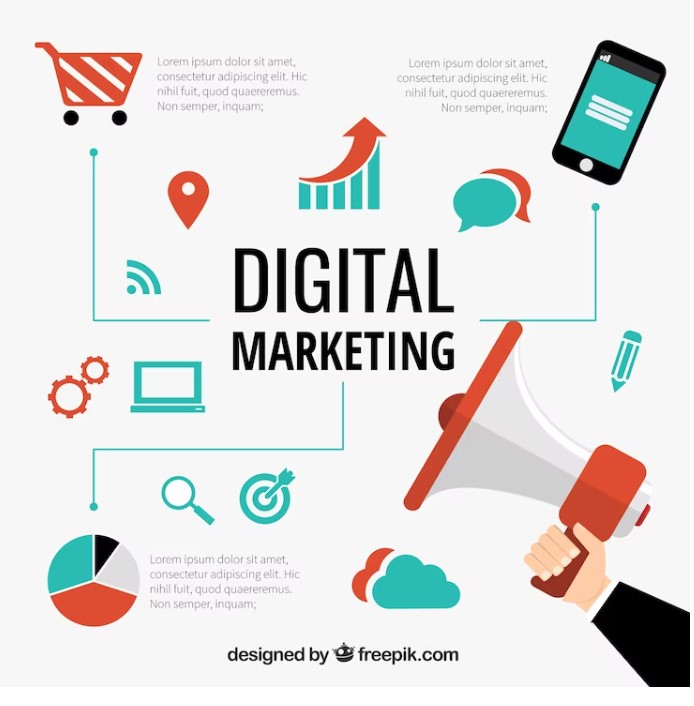Table of Contents
Introduction
Digital marketing constantly evolves, transforming how businesses promote their products and services. It involves a range of online strategies that aim to reach and engage target audiences through various digital channels.
A key advantage of digital marketing is its ability to provide measurable results, allowing businesses to track and analyze their campaigns in real time. This data-driven approach enables marketers to optimize their strategies, target specific demographics, and allocate resources more effectively.
Digital marketing offers a variety of channels to reach potential customers, including search engine optimization (SEO), pay-per-click (PPC) advertising on search engines and social media platforms, and social media marketing on platforms like Facebook, Instagram, and Twitter.
Content creation is also crucial in digital marketing, as high-quality and relevant content is essential for attracting and retaining customers. Content marketing involves creating and distributing valuable content, such as blog posts, videos, and infographics, to educate and engage audiences.
Personalization is another significant advantage of digital marketing. By analyzing customer data and automating processes, businesses can tailor their marketing messages to individual preferences and behaviors, providing a more personalized experience for customers.
In conclusion, digital marketing has revolutionized how businesses connect with their target audiences. With its measurable results, diverse channels, content creation, and personalization capabilities, digital marketing is an indispensable tool for businesses in the digital age.
By leveraging the power of digital marketing, businesses can effectively reach, engage, and convert customers in an increasingly competitive online landscape.
The Pros and Cons of Embracing a Digital Marketing Platform

In today’s fast-paced business landscape, digital marketing has become indispensable for reaching and engaging with target audiences. As businesses strive to stay ahead in the digital realm, utilizing a digital marketing platform has become a common strategy. However, like any business decision, there are advantages and disadvantages to consider when adopting such a platform. In this article, we’ll delve into the human-friendly pros and cons of using a digital marketing platform to help you make an informed decision for your business.
Advantages of a Digital Marketing Platform
1. Enhanced Reach and Targeting Isn’t it awesome how digital marketing platforms open up a whole new world of possibilities? One of the coolest perks is how they let you connect with a much larger crowd compared to those old-school marketing tactics. Imagine, businesses can now fine-tune their focus and really zoom in on the exact people they want to talk to! Social media, search engines, and those snazzy email campaigns become your trusty sidekicks, boosting the chances of turning curious folks into loyal fans
2. Data-Driven Insights You’re in for a treat with digital marketing platforms! They come armed with super-smart analytics tools that spill the beans on how your campaigns are doing. It’s like having a crystal ball for your marketing efforts, giving you all those juicy insights that can turn a so-so campaign into a superstar.This data-driven approach allows businesses to understand their audience’s behavior, preferences, and engagement levels, leading to informed decision-making for future campaigns.
3. Cost-Effective Unlike traditional advertising channels, digital marketing is often more cost-effective. With pay-per-click (PPC) advertising options, businesses only pay when users engage with their content, ensuring that resources are utilized efficiently.
4. Real-Time Interaction Engaging with customers in real-time is a pivotal advantage of digital marketing platforms. Whether through social media comments, live chats, or interactive content, businesses can build meaningful relationships with their audience, fostering brand loyalty.
5. Flexibility and Agility Digital campaigns can be easily adjusted and fine-tuned in real-time. This flexibility allows businesses to respond promptly to market trends and optimize their strategies, ensuring optimal results.
Disadvantages of a Digital Marketing Platform
1. Initial Learning Curve: While digital marketing platforms offer user-friendly interfaces, a learning curve is still associated with mastering the tools and understanding the nuances of various online channels. This might require training or hiring professionals, adding to operational costs.
2. Dependence on Technology Digital marketing is reliant on technology and the Internet. Any technical glitch or connectivity issue can disrupt campaigns, leading to a potential loss in reach and engagement.
3. Intense Competition The accessibility of digital marketing has led to a crowded online marketplace. This saturation can make it challenging for businesses to stand out amidst intense competition, requiring them to invest significant effort into creating compelling content.
4. Data Privacy Concerns: Collecting and utilizing user data for targeted campaigns has raised concerns about data privacy and security. Businesses must navigate strict regulations and handle customer data ethically and transparently.
5. Evolving Landscape The digital marketing landscape is ever-changing, with new platforms, algorithms, and trends emerging frequently. Staying updated requires continuous learning and adaptation, which can be time-consuming.
Conclusion
To sum it all up, hopping on the digital marketing train is like unlocking a treasure trove of opportunities for businesses. It’s not just about spreading your wings and reaching more people; it’s also about having those heart-to-heart chats with your customers and watching your business bloom like never before! So, why wait? Let’s dive into the digital adventure and watch those growth sparks fly!. The advantages, such as precise targeting and cost-effective strategies, can significantly impact a business’s success. However, it’s essential to consider the disadvantages, including the learning curve, technology dependence, and data privacy concerns, before fully committing to a digital marketing approach. By carefully weighing both sides, businesses can make informed decisions that align with their goals and resources in this dynamic digital era.
what is digital marketing? Explain with examples

It is most commonly used to describe advertising efforts on a computer, phone, tablet, or other electronic device. Online video, display advertisements, search engine marketing, paid social ads, and social media postings are just a few examples of the various formats it may take.
Which of the following are examples of digital marketing?
Examples of Online Marketing
SMM: social media marketing
Optimization for search engines (SEO)
Email marketing,
Marketing automation,
email marketing, and
search engine marketing (SEM).
Marketing with content on the internet.
